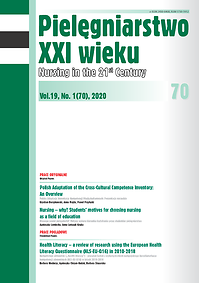Polish Adaptation of the Cross-Cultural Competence Inventory: An Overview
DOI:
https://doi.org/10.2478/pielxxiw-2020-0006Keywords:
Cross-cultural competencies, Polish adaptation, psychometric properties, multiculturalism in health-careAbstract
ADAPTATION OF THE CROSS-CULTURAL COMPETENCE INVENTORY: AN OVERVIEW
Introduction. The growing cultural diversity of Polish society creates new challenges for people who, in their professional activities, deal with culturally divergent people. Therefore, on the one hand, there is an urgent need for education and development in crosscultural competences; on the other hand, there is a need to measure these competences with reliable and accurate methods.
Aim. The goal of the present paper is recommendation of the Polish adaptation of the Cross-Cultural Competence Inventory (CCCI). In addition, the paper discusses the possible usage of the CCCI within the Polish healthcare system.
Methods. The CCCI was adapted to Polish in a multistage process [1]. Briefly, it consisted of two studies, with 455 (Study 1) and 347 (Study 2) participants, in which the psychometric properties of the CCCI were evaluated in terms of reliability, internal consistency, factorial structure, test-retest reliability, and theoretical validity, criterion and convergent validity.
Results. Although the original version of the CCCI was assumed to have a 6-dimensional factor structure, confirmatory factor analysis did not provide strong evidence for this assumption. However, as demonstrated in two studies, the Polish adaptation of the CCCI has satisfactory psychometric properties, such as reliability and validity (theoretical, criterion and convergent).
Conclusions. Results of Study 1 and Study 2 support the conclusion that the CCCI can be successfully used in empirical research among healthcare professionals and students of medical courses. Future work may focus on further improvements of the CCCI by, for example, developing Polish standardized norms for different groups of professionals.
References
1. Barzykowski K, Majda A, Przyłęcki P, Szkup M. The Cross-Cultural Competence Inventory: Validity and psychometric properties of the Polish adaptation. PLoS ONE. 2019; 14(3): e0212730 (8.12.2019)
2. Rozporządzenie Ministra Nauki i Szkolnictwa Wyższego z dnia 9 maja 2012 r. w sprawie standardów kształcenia dla kierunków studiów: lekarskiego, lekarskodentystycznego, farmacji, pielęgniarstwa i położnictwa, Dz.U.2012 poz. 631. http://prawo.sejm.gov.pl (5.06.2018).
3. Rozporządzenie Ministra Nauki i Szkolnictwa Wyższego z dnia 26 lipca 2019 r. w sprawie standardów kształcenia przygotowującego do wykonywania zawodu lekarza, lekarza dentysty, farmaceuty, pielęgniarki, położnej, diagnosty laboratoryjnego, fizjoterapeuty i ratownika medycznego, Dz.U.2019 poz. 1573. http://prawo.sejm.gov.pl (8.12.2019).
4. Loftin C, Hartin V, Branson M, Reyes H. Measures of Cultural Competence in Nurses: An Integrative Review. Scientific World Journal. 2013; 2013:289101.
5. Matsumoto D, Hwang HC. Assessing cross-cultural competence: a review of available tests. J Cross Cult Psychol. 2013; 44(6): 849-873.
6. Matveev AV, Merz MY. Intercultural Competence Assessment: What Are Its Key Dimensions Across Assessment Tools? International Association for Cross-Cultural Psychology Conferences. 2014. http://www.iacp.org/sites/default/files/stellenbosch_pdf/Matveev.pdf (3.07. 2018).
7. Szkup-Jabłońska M, Schneider-Matyka D, Kubiak J, i wsp. Ocena kompetencji kulturowych pracowników ochrony zdrowia. Fam Med Prim Care Rev. 2013; 15, 394-396.
8. Zdziebło K, Nowak-Starz G, Makieła E, i wsp. Kompetencje międzykulturowe w pielęgniarstwie. Probl Pielęg. 2014; 22(2): 367-372.
9. Dobrowolska B, Ozga D, Gutysz-Wojnicka A. i i wsp. Kompetencje i potrzeby edukacyjne pielęgniarek OIT w zakresie opieki wielokulturowej. Raport projektu: 2016-1-PL01-KA202-026615. Aug 2017. http://mice-icu.eu/wp-content/uploads/2017/12/O1-ICU-Nurses-intercultural-training-needs-and-competenciesanalysis-report_PL.pdf (25.07.2018)
10. Lubowiecki-Vikuk A, Gnusowski M. Rola kompetencji międzykulturowych na rynku turystyki medycznej w Polsce. Hyg Pub Health. 2016; 51(3): 255-261.
11. Majda A, Zalewska-Puchała J. Wrażliwość międzykulturowa w opiece pielęgniarskiej. Probl Pielęg. 2011; 21(3): 327-334.
12. Majda A, Zalewska-Puchała J. Kulturowe odrębności w pielęgniarstwie. [w:] Zarzycka D, Ślusarska B, red. Podstawy pielęgniarstwa. Założenia koncepcyjnoempiryczne opieki pielęgniarskiej. Warszawa: WL PZWL; 2017. pp. 119-140.
13. Majda A, Zalewska-Puchała J. Kompetencje kulturowe i inteligencja kulturowa w pielęgniarstwie. Pielęg Pol. 2018; 2(68): 196-303.
14. Mroczkowska R. Odmienność kulturowa jako nowe wyzwanie w praktyce pielęgniarki i położnej. Pielęg Spec. 2013; 1: 27-31.
15. Ślusarska B, Zarzycka D, Majda A, Dobrowolska B. Kompetencje kulturowe w pielęgniarstwie – podstawy konceptualizacji i narzędzia pomiaru naukowego. Pielęg XXI w. 2017; 4(61): 40-45.
16. Kiszka J, Ozga D, Mach A, Krajewski R. Udzielanie pomocy pacjentom odmiennym kulturowo na tle współczesnych migracji. Pielęg XXI w. 2018; 1(62): 30-36.
17. Ozga D, Dobrowolska B, Gutysz-Wojnicka A. i wsp. Multicultural Care in European Intensive Care Units (MICE-IC) – International project for ICU nurses. Pielęg XXI w. 2018; 62(1): 50-52.
18. Ozga D, Jadczak M. Deklaracja Brisbane zbiorem wytycznych dla pielęgniarek OIT, dotyczących opieki nad pacjentem odmiennym kulturowo. Pielęgniarstwo w Anestezjologii i Intensywnej Opiece 2018; 4(1):1.
19. Benbenishty J, Gutysz-Wojnicka A, Harth I, et. al. The migrant crisis and the importance of developing cultural competence in the intensive care unit. Nursing Critical Care 2017; 22(5): 262-263.
20. Arredondo P, Toporek, R, Brown S, et al. Operationalization of the Multicultural Counseling Competencies. Journal of Multicultural Counseling Development. 1996; 24(1): 42-78.
21. Barzykowski K, Majda A, Szkup M, Przyłęcki P. The Polish version of the Cultural Intelligence Scale: Assesment of its reliability and validity among healthcare professionals and medical faculty students. PLoS ONE 2019; 14(11): e225240 (8.12.2019)
22. Earley PC, Ang S. Cultural Intelligence: Individual interactions across cultures. Stanford: Stanford University Press, 2003.
23. Hammer MR. Behavioral dimensions of intercultural effectiveness: A replication and extension. Int J Intercult Relat. 1987; 11: 65-88.
Downloads
Published
Issue
Section
License
Copyright (c) 2020 Authors

This work is licensed under a Creative Commons Attribution-NonCommercial-NoDerivatives 3.0 Unported License.




